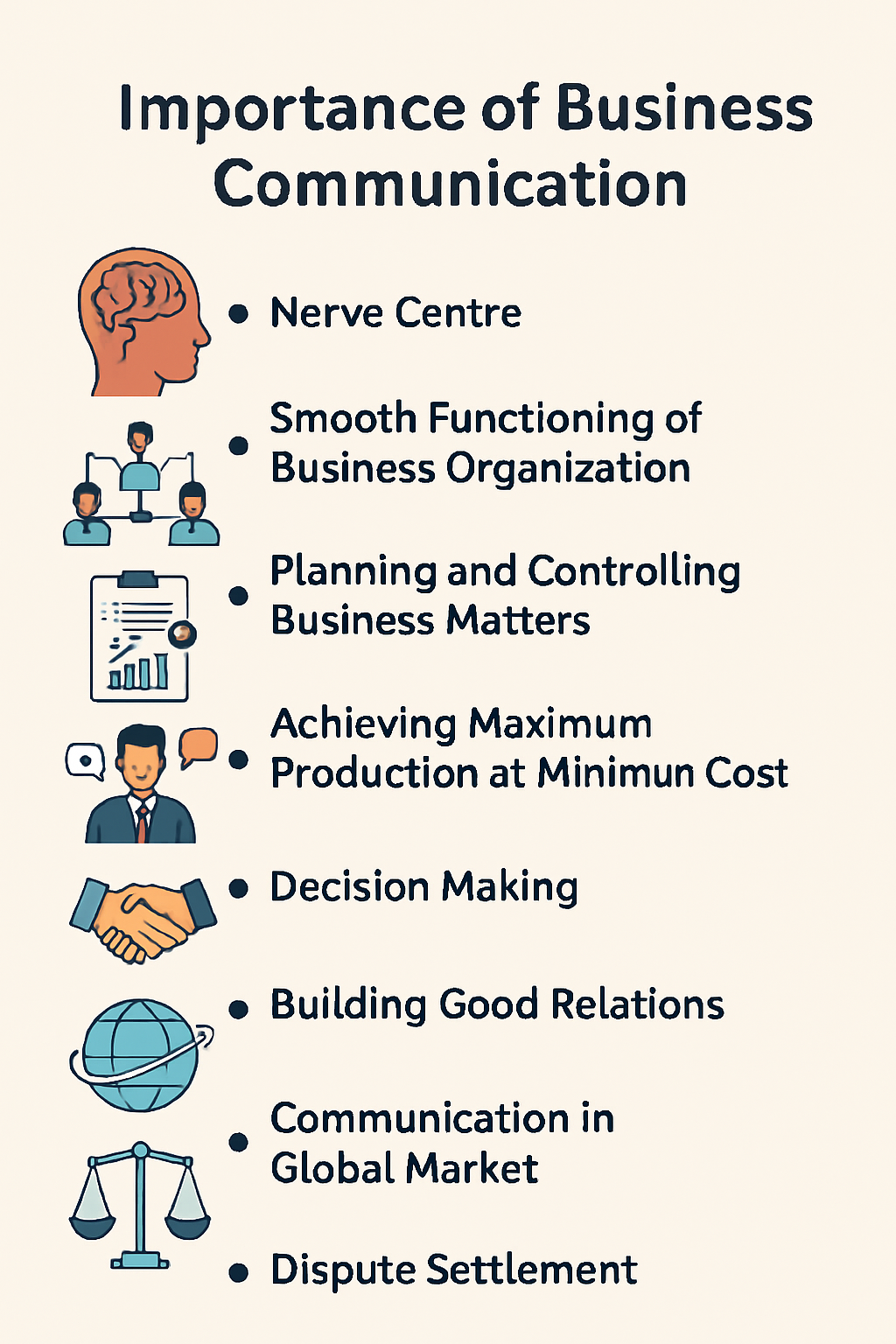Communication and its Importance in Modern Business
Question No.1: What is business communication? What is its importance in modern business?
Communication
The word “communication” originates from the Latin term Communico, meaning to share. In essence, communication refers to the process of sharing ideas, thoughts, feelings, facts, or information between individuals or groups. It enables mutual understanding and cooperation. Literally, it includes informing, telling, showing, or spreading knowledge from one person to another. Communication is the foundation of every human interaction and societal function. Without it, no system, whether social, educational, or business-oriented, can survive or function properly.
Throughout history, thinkers have defined communication in various ways:
- Oxford Dictionary defines communication as “the action of conveying or exchanging information and ideas.”
- James B. Stull states, “It is the process of sending or receiving a message.”
- Kaith Davis explains, “Communication is the process of passing information and understanding from one person to another.”
From these definitions, we understand that communication involves a purposeful exchange of messages, ideas, opinions, facts, and emotions. It is not merely about speaking or writing; it is a continuous process involving listening, understanding, and responding. Communication must be clear, concise, and directed toward a specific goal.
What is Business Communication?
Business communication refers to the exchange of relevant information—whether verbal, non-verbal, or written—that is essential for the successful operation of a business. It facilitates the promotion, development, and management of business activities. Business communication occurs between individuals, teams, departments, firms, or even across global corporations. It includes both internal communication (within the organization) and external communication (with clients, partners, or suppliers).
No business can prosper without effective communication. We can state without hesitation that business communication is the lifeblood of every business. It keeps the workflow smooth, supports informed decision-making, strengthens relationships, and ensures that everyone remains aligned with the company’s goals.
Importance of Effective Business Communication
Effective communication is one of the most valuable skills in any business environment. From ancient oral traditions to modern digital communication, the evolution of communication practices has profoundly impacted business methods. Today, both oral and written communication remain crucial. Their combination has created advanced strategies for professional correspondence, negotiation, and report writing.
Communication affects every aspect of business—from top-level planning to day-to-day operations. Below is a detailed explanation of its significance under specific headings:
A. Nerve Centre of Business Operations
Just as blood is vital to the human body, communication is essential to business operations. In today’s complex, fast-paced world, businesses face a multitude of challenges—global competition, changing technology, consumer demands, and workforce diversity. Tackling these challenges requires swift and effective communication at all levels. Whether it’s delivering instructions, issuing updates, or responding to crises, communication serves as the central nervous system of business functionality.
B. Smooth Functioning of Business Organization
A business comprises numerous departments and employees performing various tasks. For the organization to function smoothly, there must be a constant exchange of ideas, instructions, suggestions, and feedback. Whether it’s coordinating production, handling sales, or delivering customer service, effective communication ensures that all members work in harmony. Poor communication often leads to confusion, delays, and reduced morale.
C. Planning and Controlling Business Matters
Strategic planning is crucial to business success. However, without communication, planning becomes ineffective. Management must communicate plans clearly to departments and employees to implement them efficiently. Similarly, control mechanisms—like feedback systems and performance evaluations—depend on transparent communication. Regular updates and accurate reports allow managers to monitor progress and adjust strategies as needed.
D. Achieving Maximum Production at Minimum Cost
Profitability depends on productivity and cost control. To achieve this balance, effective communication is required between management, employees, suppliers, and customers. For example, timely instructions to workers and prompt feedback from clients can improve efficiency. Moreover, communication with vendors helps negotiate better deals, manage inventory, and prevent overstocking. The smoother the flow of communication, the lower the chance of mistakes and wastage.
E. Decision Making
Every business involves decision-making, whether related to marketing, finance, staffing, or operations. Good decisions rely on accurate information, collected through communication channels. Employee suggestions, customer feedback, market data, and inter-departmental reports all contribute to better decision-making. Through effective communication, managers can assess situations quickly and choose the most suitable course of action.
F. Building Good Relations
Relationships are the backbone of every business. Communication builds trust and understanding between employees, managers, clients, suppliers, and the general public. Internally, it fosters teamwork and cooperation. Externally, it enhances a company’s image and credibility. Resolving misunderstandings, responding to complaints, and showing empathy—all depend on effective communication.
G. Communication in Global Market
In the age of globalization, businesses no longer operate in isolation. Communication with international partners, clients, and suppliers is now routine. Mastery of business communication—especially in English—gives businesses a competitive edge. Whether drafting contracts, conducting virtual meetings, or delivering presentations, effective communication helps in building lasting international relations and expanding market reach.
H. Dispute Settlement
Disputes between management and workers, or among employees themselves, are common in business settings. If not resolved promptly, these conflicts can damage morale and productivity. Effective communication allows open dialogue, mediates grievances, and promotes understanding between conflicting parties. Transparent communication policies and complaint-handling procedures are essential for peaceful resolution.
In conclusion, the importance of business communication cannot be overstated. It governs every function within an organization—from management and planning to marketing and customer service. We can confidently say that failure in communication leads directly to failure in business. Therefore, organizations must train employees in communication skills and encourage a culture where open and respectful communication thrives.

Business English and Its Importance in Modern Business: https://englishwithnaeemullahbutt.com/2025/08/07/business-english-in-modern-business/
Discover more from Naeem Ullah Butt - Mr. Blogger
Subscribe to get the latest posts sent to your email.
